Turkeys aren’t nearly as common in backyard flocks as they should be. The large and comedic birds are easy to raise and just as entertaining as they are edible.
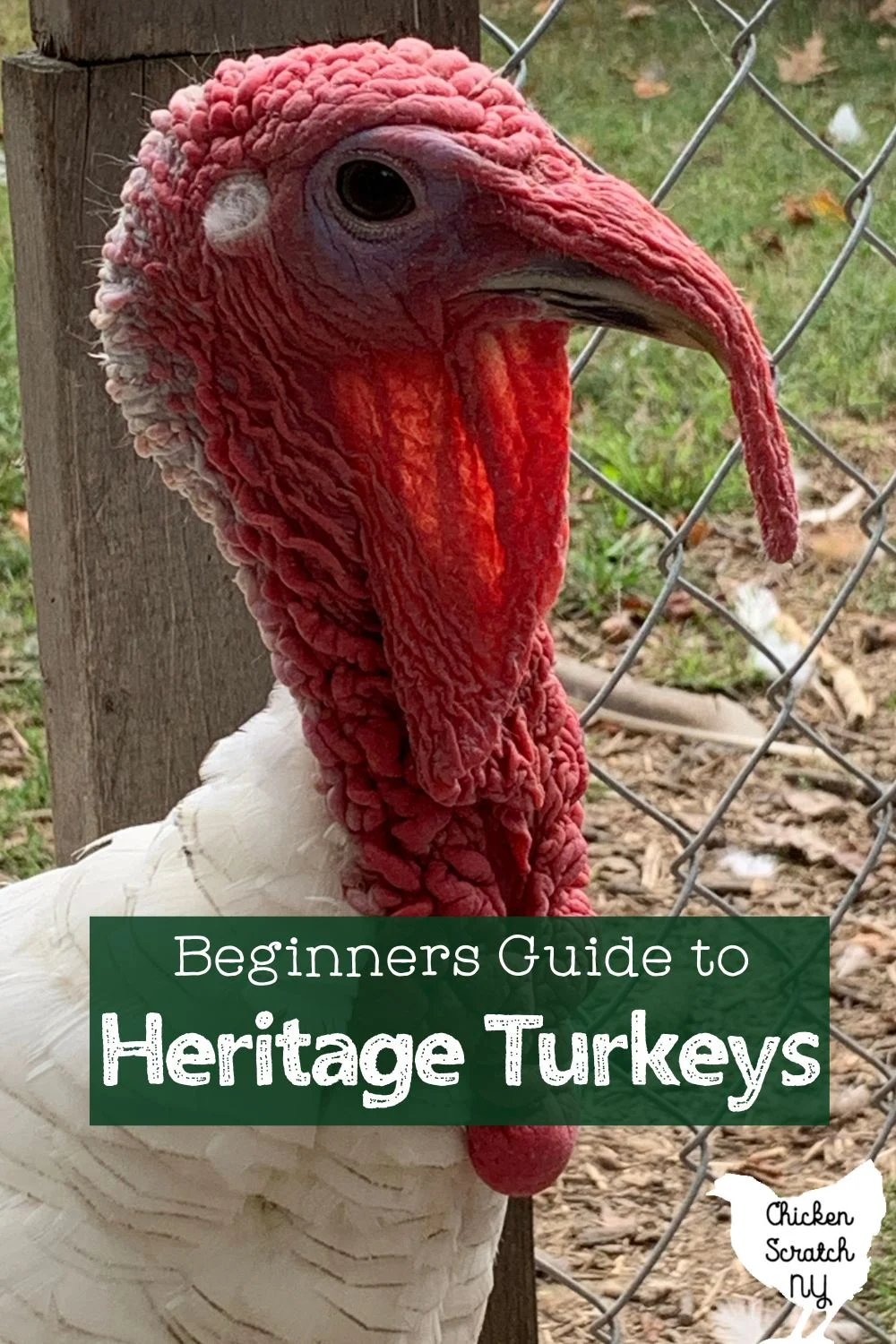
The first birds I ever bought on my own were heritage turkeys, not chickens (so it should technically be Turkey Scratch NY but it’s been 11 years and I can’t change it now). My original turkey flock came from Cackle Hatchery and it was half Royal Palm and half Bourbon Red.
We ate all of the reds and the Royal Palms moved from the house I rented to the house I bought. My main man, Gobbles, was part of that original flock.
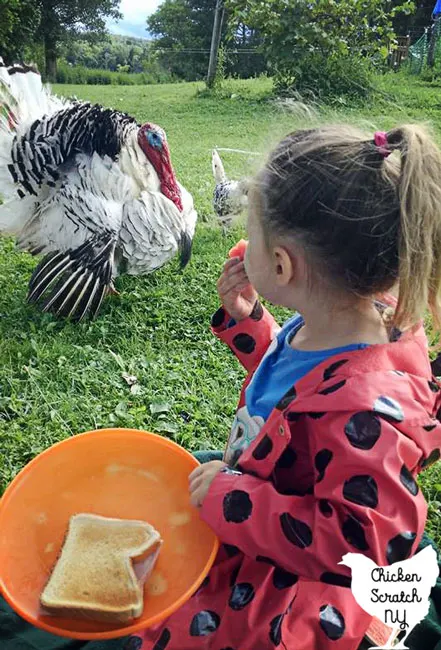
After Gobbles wandered off into the sunset to die (at 8 years old) I spent a year without turkeys. You would think they wouldn’t be missed with all of the chickens, ducks, guineas, and geese.
Read more about The Chaotic Reality of Keeping Geese
You would be wrong. I missed my turkeys and my daughter missed them so much she begged me to get more turkeys. So in 2019 we got back on the turkey train and started another batch of heritage turkeys.
Why We Love Raising Turkeys
Without any hesitation, I can tell you that the turkeys are my favorite birds to raise. Our turkeys are less useful than the chickens, other than selling their children they’re pretty much just lawn ornaments.
Turkeys are Hilarious
It really comes down to this. Turkeys are so dramatic, especially the toms.
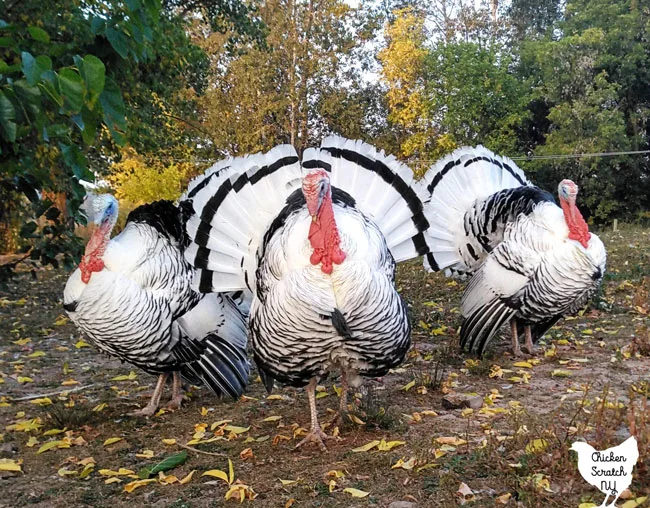
Tom turkeys spend 95% of every day strutting. They always look like they’re posing for their next album cover.
A lot of people say turkeys are dumb, I can’t say that I’ve noticed them being any stupider than my chickens. But they are super clumsy. They’re so focused on looking hot that they trip all the time and walk into things.
Years ago I had a game camera set up in the back yard during a rough spot with foxes. When I checked the card it was literally hours of footage of Gobbles strutting around a metal garbage can looking at his reflection.
They’re just goofy, silly, funny birds and they make me so happy.
Turkeys Make the Best Sounds
We have a lot of unique sounds going on in the backyard, everything from classic crows, loud quacks, louder honks, and the loudest “chi-chi-chi-chi” and “buck-wheat” guinea calls. But the turkey sounds are the best.
Tom turkeys never stop gobbling. I haven’t yet gotten sick of the sound, which is great because my kids love to get them going.
All it takes is a single “gobble” and they’ll start going off. I’m not talking about an actual turkey impression, just saying the word ‘gobble’ is enough!
I live in an area surrounded by farm fields with dozens and dozens of wild turkeys. I’ve counted up to 35 before giving up.
My turkeys call in the wild boys all the time. One day I was watching Gobbles out on patrol in the field and he called in a huge tom.
Out of nowhere his best friends, two adult guineas, appeared and beat up the wild tom chasing him away. Knowing the guineas penchant for violence, that was the plan the whole time.
As fun as the boys are, in my opinion, the best sounds come from the hens. Turkey hens chirp and purr. They are very vocal but in a softer way than the toms.
Turkeys are Big
I’ve always been a fan of big birds, my favorite chickens are Brahmas and Cochins. I just want giant fluffy birds.
The large size might seem intimidating but it has it’s own advantages.
In my experience, large birds are like large dogs. They’re more chill and they’re less likely to be eaten by hawks.
I’m not saying you’ll never have a problem with predators but most things that will eat a chicken in a heartbeat will think twice before messing with a full-sized turkey.
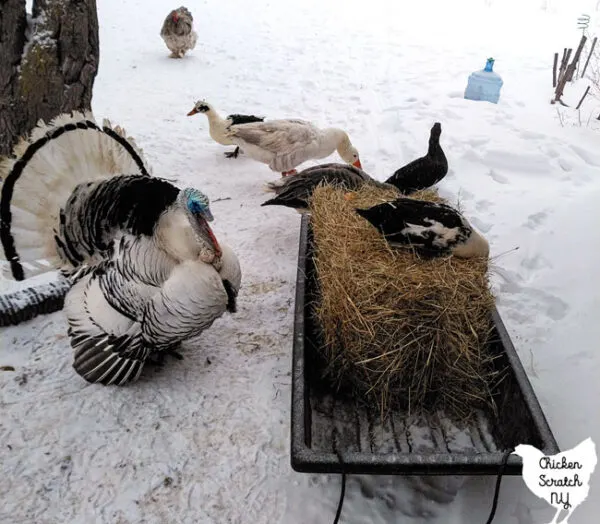
Enough about my justified obsession! If you’re here you’re probably curious about raising turkeys and I’m sure you have some questions.
Instead of just regurgitating what the books say I wanted to throw in some of my own experiences along with what I’ve picked up talking to other turkey people and my overgrown library of homesteading books.
What Kind of Turkey Should You Get?
Before we get into keeping turkeys you need to decide if you are raising them for Thanksgiving dinner or you’re interested in a more long-term relationship.
If you’re looking for the fastest route to a succulent turkey dinner you should be looking at the Broad Breasted White and the Broad Breasted Bronze. They are the cornish cross of turkeys.
Broad breasted birds grow much faster and they have a lot of breast meat compared to the heritage birds. Heritage birds have less meat overall and a higher percentage of dark meat, I think they have a lot more flavor as well.
I’ve never raised the broad-breasted types, I’m a big fan of sustainability and being able to raise my own replacements.
Heritage turkeys are the old school, barnyard, capable of breeding without a turkey-baster turkeys. This is what you are looking for if you plan to keep your birds past their 1/2 birthday.
Turkey Basics
Out of all of the birds you can raise in a backyard flock, turkeys have the most in common with chickens. They have their own unique behaviors and quirks but when it really comes down to it, if you can handle raising chickens, you can handle a turkey.
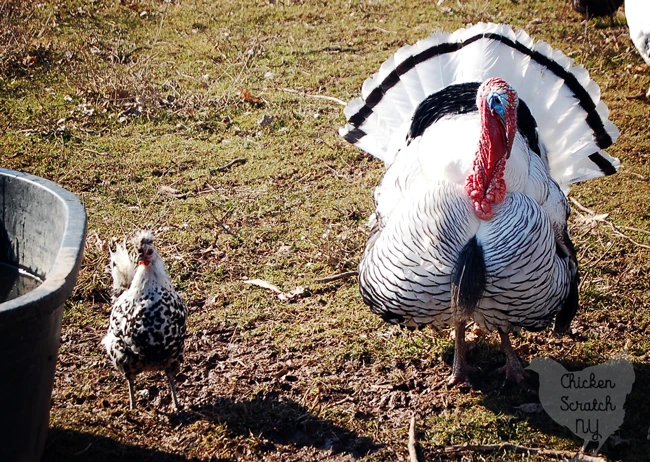
Just like chickens, turkeys are flock animals, they tend to hang out, forage and sleep with the other turkeys. All of my birds live together, which means the chickens, geese, ducks, guineas, and turkeys share a large coop, the barn, and my entire property.
But the turkey stick with the turkeys. When I was down to just Gobbles he started hanging out with my two adult guineas. They were always together.
Tom Turkeys
Male turkeys are called Toms. Think of tom turkeys as the Dolly Parton of the backyard flock. They are flashy.
Toms are both larger and louder than hens. They constantly gobble and strut around.
When turkeys strut they drop their wings down to the ground, puff up their feathers and fan their tails. Their faces flush with color, the snood (that long dangly bit that hangs over the beak) turns bright red and droops lower, and the caruncles (the rounded lumpy bits on the neck above where the feathers start) get bright red.
Along with the large snood and impressive feathers, tom turkeys grow a beard. Unlike a human beard which is found on the face a turkey beard grown from the center of the chest.
The beard looks a lot like a horsetail but it’s actually a clump of long skinny feathers. Hens can grow beards (mine has one) but it’s less dramatic and smaller, it’s a genetic trait and about 10-20% of female turkeys will have them.
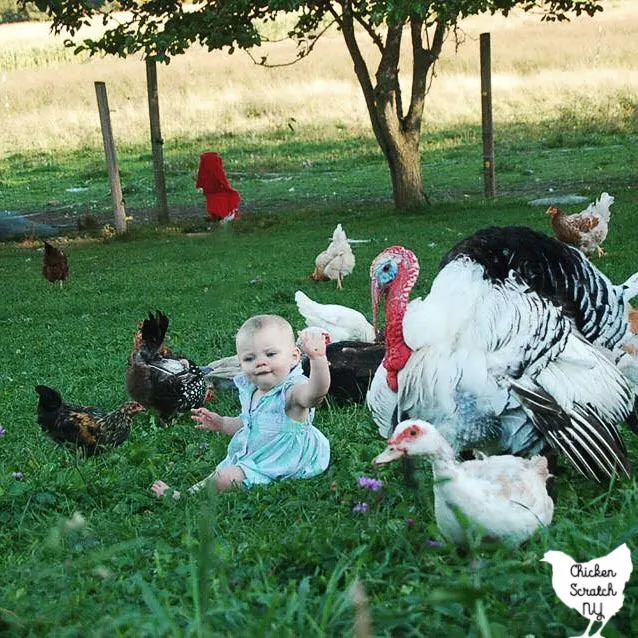
Toms can be aggressive, Gobbles hated my ex-husband and used to jump at him. He was never aggressive with anyone else, he loved me and used to hang out with the kids all the time.
Gobbles was also afraid of my dog Alfie and if he was around Gobbles kept his distance. Our current flock of turkeys has never shown any aggression towards people.
The boys do squabble amongst themselves, especially in the spring when the hens are laying. I’ve seen them with scabbed up faces from squaring off with each other but no serious injuries.
Most of the time the three dudes just strut around the yard in dramatic formations that would make any synchronized swim team sit up and take notice.
Turkey Hens
Turkey hens are smaller, quieter, and calmer than the boys.
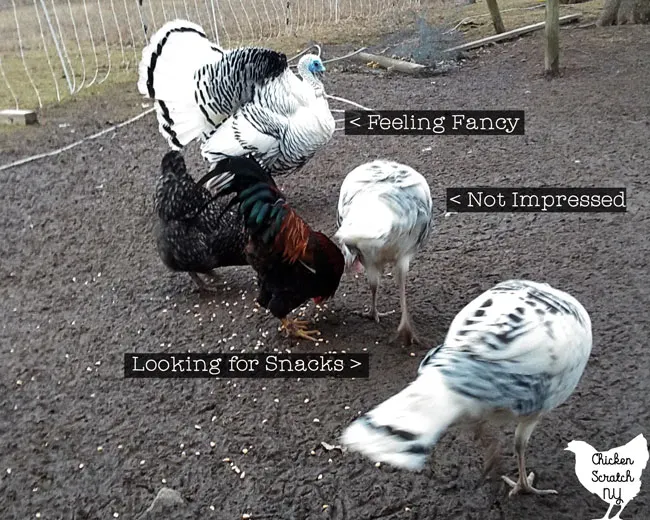
A snapshot of life in my backyard: tom turkeys strutting around giving off those Dolly Parton vibes and the hens are completely ignoring them, looking for snacks. It’s not that different from being a woman on a dating app.
Turkey hens can have beards and they can fan their feathers like the boys. I have a video of one of my girls doing it here on my Instagram stories.
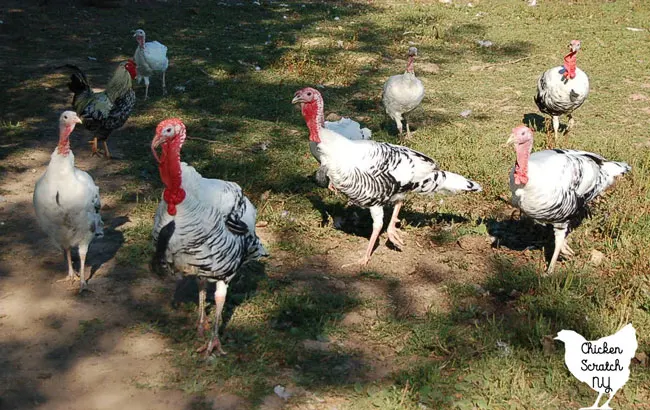
The size difference is a dead giveaway between the boys and girls. The other big difference is the snood and the gobble, hens have a little nub above their beaks and they make different sounds.
In the picture above you can see the hen all the way to the left has a small beard. The four male turkeys have much thicker legs, redder and droopier faces, and more black barring on the chest feathers.
Turkey Eggs
Turkeys lay large, speckled eggs. The eggs are larger than duck and chicken eggs and smaller than goose eggs.
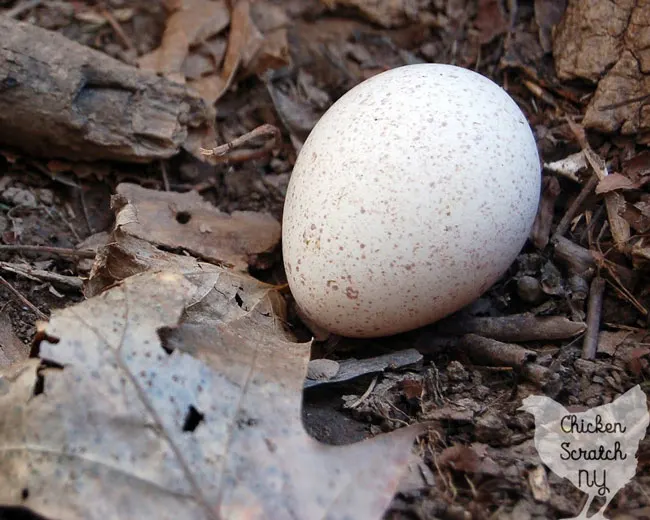
They are seasonal layers. Heritage turkeys can lay between 80-100 eggs a year.
Turkeys are just like chickens when it comes to broody behavior. When they start sitting on eggs they will stop laying. If you keep collecting the eggs they will keep laying.
Read more about Broody Hens
Turkey eggs are perfectly edible but they’re less common because of the seasonality. Turkey hens lay fewer eggs than chickens and they’re so much bigger that the food cost isn’t worth the egg production.
If you’re looking for eggs chickens and ducks are the way to go.
Read more about What to Expect from Farm Fresh Eggs
Broody Turkeys
I haven’t has as much experience with turkey moms as I have with chicken moms but they seem to do a good job. Last year one of my turkey hens hatched out three chickens and raised them until they were old enough to be on their own.
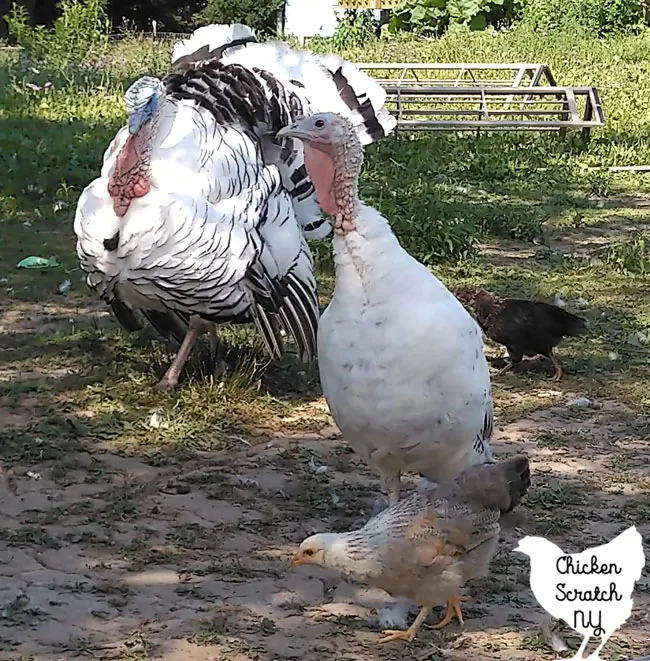
She had been sitting on turkey eggs but none of them were fertile, the turkeys were a few months past their first birthday and I don’t think the boys were hitting the target yet. A few chickens snuck into the bowl she had been nesting in and 3 weeks later she had chicks.
I set her up in a pen for a week or so, I usually separate my new moms to give the babies a chance to get strong before they go on nature walks. My fear was once she left the pen she’d take off and abandon the chicks but she stuck by them and did a great job.
My other fear was that the toms would try to kill the chicks because they’re chickens and they speak a different language. Fortunately that didn’t happen either and the toms just hung around the mom and babies without any issues.
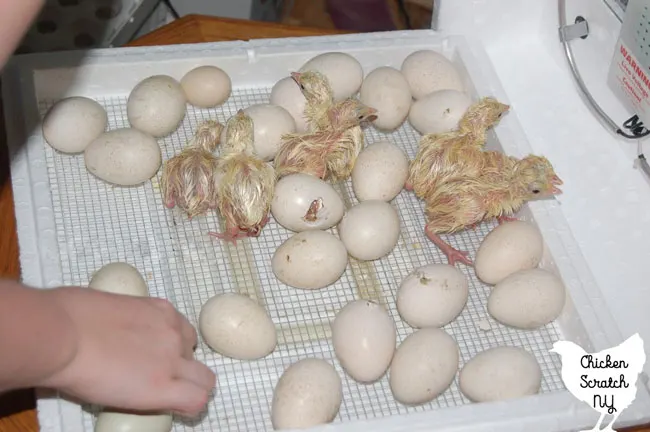
Chicken eggs take 21 days to hatch and turkey eggs take 28 days to hatch, which isn’t that surprising considering the size difference.
Last year I tried to hatch turkey eggs and chicken eggs in the incubator at the same time. I started the turkey eggs 1 week earlier, unfortunately my Toms were not on their game (or on the hens) and none of the eggs were viable. I will be trying that again this year.
2020 was a big year for cross-species parenting in my backyard, I had a turkey raising chickens and a chicken raising guineas. 2021 I might try sticking turkey eggs under a chicken, that way I can keep my turkey hen laying and still get some hen-raised babies.
Turkey Poults
After 28 days in an incubator or under a bird those pretty speckled eggs turn into baby turkeys or turkey poults.
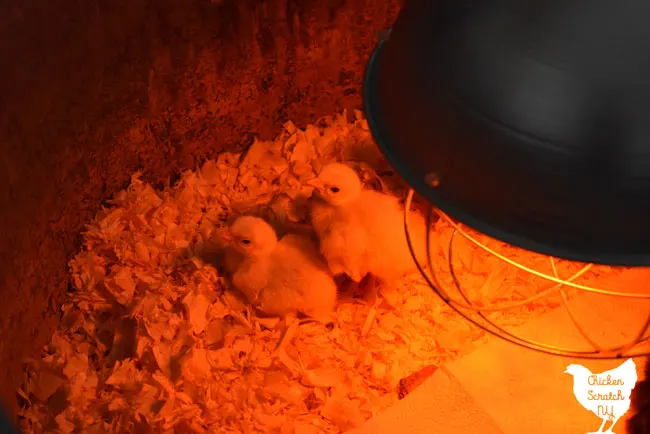
Poults look like large, slightly gangly chicks with a pimple above their beak. I have a soft spot for awkwardness and turkeys come out of the shell oozing with it.
Feeding & Watering Turkeys
Turkey poults have higher protein requirements than chicks. I feed mine Gamebird Starter with 30% protein.
Adult turkeys can be fed gamebird feed or flock raiser which has a higher protein content than chicken feed. I feed all my birds the same food.
They get whole corn, scraps from the kitchen (greens, fruit & vegetables), the occasional egg loaf and sometimes I throw in scratch or flock raiser pellets. They also have a bowl of oyster shell.
My birds all free-range and do a great job finding their own food when the ground isn’t covered in snow.
Read more about the Challenges of Winter Chicken Keeping
I use large rubber bowls for water, I’ve tried a lot of different styles of waterer over the years and that’s what works for me.
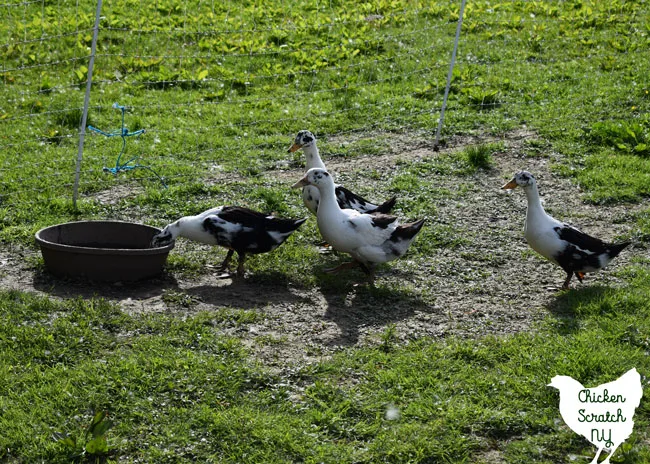
Gravity waterers, the kind you fill up, add the lid, and flip work great for turkeys. Unlike ducks and geese, they don’t have to stick their faces underwater.
Read more about Different Types of Poultry Waterers
Turkey Coops
Once your turkey poults are ready to leave the brooder they’ll need a coop to call home. Turkey coops are basically the same as chicken coops, just bigger.
Turkeys are obviously larger than chickens and need more space per bird. Plan for about 6 square feet per bird in the coop if they will have access to the outdoors.
Make sure any small doors are cut large enough to allow the turkeys to pass through comfortably.
My property is fenced in with a hodgepodge collection of different wire fencing. I have 3-foot tall wire fence across the front lawn.
It was originally put in place to keep the ducks from playing in the road but it has done a great job keeping everything but the guineas and a few chickens in the back.
Turkeys can jump and fly a bit but mine are pretty lazy and they know where the food is so they don’t bother going over the fence.
Turkey Roosts
One of the biggest issues you’ll have with turkeys is getting them to sleep in the coop or barn. Turkeys will roost in trees and trust me, once they’re up there it’s not easy to get them down.
My turkeys sleep in the coop, they have lots of options but they prefer the high (6.5 ish feet) tree branch roost. I literally dragged a dead tree into the barn and screwed it up for the birds.
Learn How to Make a Fold Up Roost
Royal palm turkeys are on the smaller size for turkeys and larger breeds might not enjoy the 6.5 foot drop to the ground every morning.
It’s fairly common for people to raise turkeys on range where they sleep on roosts in open sheds. This is a popular method for Thanksgiving turkeys that won’t be around for the winter.
I made the mistake of letting my adult turkeys sleep outside the barn on a beautiful winter night when the temps were starting to warm up. The next morning I was able to trace the path of the turkeys and the coyotes that killed and ate them in the snow.
I learned my lesson that day and now my turkeys sleep in the barn every night. If you decided to use the range method make sure you have a good predator fence like the electric net fences from Premier One.
If your turkeys have gotten into the habit of sleeping outside the coop and you want to put an end to it you can try feeding them about an hour before bed and then locking them in. After doing for a while they should adapt their behavior and start sleeping in the barn on their own.
Turkey Nests
Turkeys will lay on the ground or in nest boxes. Hens will try to hide their nests when they’re out free-ranging, I would advise you to do whatever you can to prevent that.
If you notice your turkey hen is missing at night and you can’t find her cross your fingers and wait for the morning. If she makes it through the night she’ll show up for breakfast.
Then you get to carefully stalk her to find the nest location. Wait until it’s dark and then go back to the nest and bring her into the barn along with any eggs she’s been sitting on.
Move her into a small pen with a pile of bedding for her nest. You might get lucky and she’ll continue on nesting in the new spot or she might abandon the nest, either way, you kept your turkey hen safe from predators.
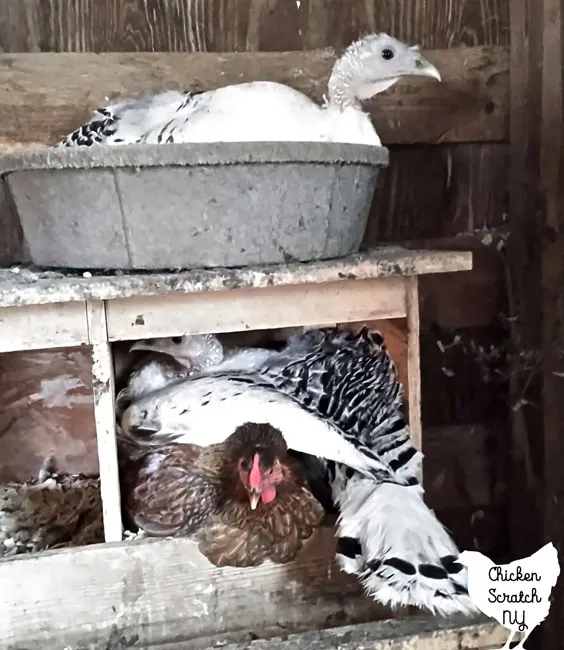
I have a large set of wooden nest boxes that my grandfather made me that the turkeys enjoy, they ginore the smaller metal boxes. They have also make nests in large black rubber bowls set up on top of the nestbox.
I haven’t had any luck with nests on the ground, the chickens get into them and scratch everything up as soon as the turkeys stand up.
Again, royal palms are smaller turkeys, if you have bigger birds like Narragansetts you will need more room.
Can you keep Turkeys with Chickens?
This is the biggest controversy/question when it comes down to keeping turkeys. I always say chickens are the gateway drug to homesteading and they are where most people start.
If you start doing any digging into keeping turkeys one of the first things you’ll see is “don’t keep turkey with chickens or they’ll all die”
The reasoning behind that sentiment is Blackhead disease or Histomoniasis. Blackhead is caused by a protozoan parasite spread through roundworms, and it’s almost always fatal in turkeys. Between 70-100% of infected turkeys infected with histomoniasis will die.
Blackhead can also affect peafowl, pheasants and wild turkeys. It can not infect humans.
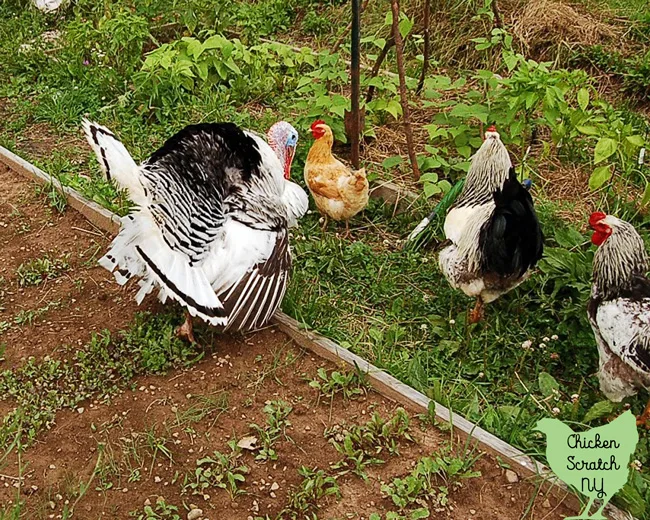
So what does a parasite have to do with chickens? Chickens are great hosts for the worms that host the parasite. They can be infected with no signs, symptoms, or issues.
There is no treatment or vaccine for the disease and it can remain active in the soil for 4 years.
Everything I have read about Blackhead disease has related to commercial operations. I have a feeling that turkeys are just less common than chickens and haven’t been studied much outside a commercial setting.
I have only raised heritage turkeys on a small scale and I’ve never had any issues with Blackhead. I’ve talked to other people who keep turkeys with chickens and none of them have had to deal with it either.
However, it is a risk that you should be aware of if you decided to keep turkeys with chickens.
The symptoms of Blackhead are basically the same as every other poultry illness; listlessness, drooping wings, loss of appetite, and ruffled feathers. In later stages of the disease, you might notice yellow droppings.
It’s called ‘Blackhead” because the sick birds face can turn bluish or black. It doesn’t happen in all cases and it’s considered an unreliable symptom.
Earlier this year I lost one of my turkey hens, she went downhill really quickly and nothing I did helped. Every time I have a sick turkey my first thought is, oh crap, it’s here.
After a necropsy I was able to see she hadn’t died from histomoniasis, her liver was beautiful and in perfect condition lacking the liver lesions found with infection.
Instead it turned out she had eaten a sewing pin (I have no idea where she got a sewing pin) and it had pierced her gizzard. It was really sad but also reassuring to know that we’re still blackhead free.
Can you Keep Turkeys with Ducks, Geese or Guineas?
I have a large mixed flock and right now the turkeys run the show. It’s a little bit strange because the geese and guinea fowl are both much more assertive but the turkeys seem to be in charge.
At night I actually have to lock the tom turkeys into the coop or they won’t let the geese into the barn. The space related issues seem to be worst in the winter when the birds don’t have as much room to roam.
I have seem my tom turkeys trying to mate with my ancona ducks. Anconas are patterned with splotches of black and white. I don’t know if the turkeys see the color and assume they’re misshapen turkeys or if they’d do the same with any ducks.
After googling it I found out some other people had the same experiences. The ducks haven’t been hurt yet and obviously, I don’t want them to be so for the time being I make sure the ducks are outside the coop when I close up.
They are much smaller than the turkeys and can get away from them by going underneath things.
Housing turkeys with ducks and geese can be a problem if the waterfowl get the bedding really wet. It’s pretty easy to prevent by keeping all water sources as far as possible from the sleeping areas.
I know that was a lot of information!
If you have any specific questions you can leave them in the comments, email me at Alecia [at] chickenscratchny.com or find me on Instagram
Check out my Livestock page for more info or start here:

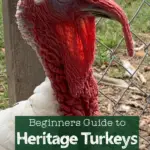
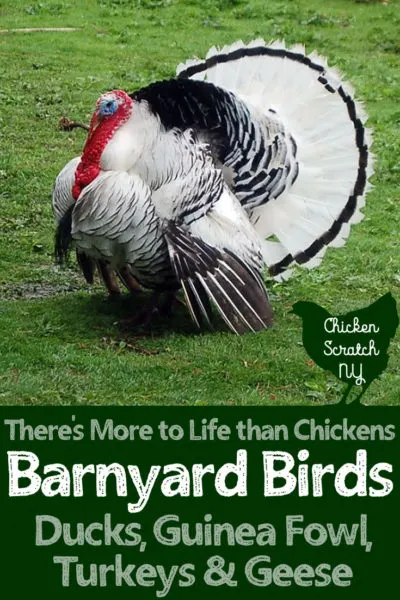
JEFF and Marcy
Friday 17th of May 2024
I have a BBW male Turkey, He was very overweight. He is pretty much seditary, but He did get up and follow Me around. He is the Sweetest Guy ever. He has become sick over a period of about 6 weeks. He is laying around all the time. He lost probably 15 t o 18 lbs of weight. He has either green runny poop or yellow watery poop. He still eats and drinks ok. I'm So afraid that I'm gonna loose him, he is probably 2 years old. Please let Me know what I can do for Him.
Alecia
Saturday 25th of May 2024
Unfortunately, broad breasted birds don't have the best genetics for long lives. Once they reach maturity their mass is very hard on their joints & organs including their hearts.
Is it possible that he's over heating? I would try cutting back on food or switching to a lower protein & fat option and adding in greens and lower-calorie high-moisture content foods and that might help for a while.
Debrah
Friday 11th of November 2022
Hi Alecia. Sounds like you know a lot about turkey needs. Do I need to provide heat for pet heritage turkeys in the freezing temperatures? They are in a coop that allows freezing temperatures. I thought about coats but they might get overly stressed. Thanks, Deb
Alecia
Friday 11th of November 2022
Hi Deb, as long as you have a draft-free coop and you feel them well your turkeys will be fine in the winter. The most important thing is to let them adapt to the cold, I never heat my coop so if the power were to go out my birds aren't used to that extra help. In the fall turkeys will molt and grow in a brand new coat of feathers to help them stay warm, usually they'll fluff up and tuck their heads away to stay warm when they sleep. On really cold nights I take out extra whole corn before bed, digesting the extra calories will help keep them warm.
Jennifer Lewis
Saturday 23rd of July 2022
Thank you so much for this wonderful article! I already have chickens, ducks, geese, and Guineas. I have wanted to try turkeys for a while but was always concerned about their size. But it’s “chick days” at my local feed store, and I try desperately to keep my eyes averted so I don’t go home with more babies. No luck yesterday…they had Royal Palm and Bourbon Red poults. It was all over when I put my finger in to an inquisitive Red and all of them came running to attack my sparkly ring. I’m such a pushover! I came home and got their brooder area ready and am now super-impatiently waiting for the feed store to open so I can get my new babes! My last nagging decision is which breed (or both) and how many. This article was both amusing and enlightening, and I’ve bookmarked it to come back to. Thanks again!!!
Dakota Waters
Friday 31st of December 2021
Good morning! I don't know if you'll see or respond to this but I have been a "homesteader" since March 1st of 2021 (Southeast Missouri area, zone 6B.) I am on an extremely low extremely fixed disability income so I am making do with absolutely anything I can get my hands on that's free lol. I just lost my vehicle the end of October as well so the situation is a little tough. I bought some turkey poults early summer, a male and female for me, a male and female for my friends who are completely off-grid and therefore I brooded theirs for them, and a female for another friend on the other side of me which I also brooded for her. So I brooded five turkey poults with four guineas (succeessfully!) and integrated into a flock of two geese and all of my chickens of which there are less than 20. I never had any clue in the world that you weren't supposed to keep them together and so I didn't separate them. I've had no problems with him until one day I suddenly did. I'm surprised as well because my young Tom, Teardrop, (don't laugh at the name LOL there's a story behind it), is a sweetheart and has a female in with him. It started one day when I was throwing big handfuls of leftover popcorn out for everyone and suddenly my Tom grabbed my Roo and attacked him, yanking him into the large 10 x 10 kennel and seriously injuring his leg before I could even get in to him. Gallagher ended up dying many weeks later. He never healed from it. So now the turkeys are kept in their own 10 x 10 pen but I hate it. I want them to be able to reintegrate with the flock. The chickens and guineas have no problem with it but I have a male brown Chinese goose with a female Embden that I got for him so he would stop tearing his bill up on the fencing (loneliness/boredom) and I don't think they're going to get along. I have 3 acres and about an acre is cleared. The rest is treed but I have lots of hawks in the area as well as black vultures, possums, and raccoons. I have heard that there has been a predator cat seen in the area as well, possibly Bobcat I'm not sure. The point is, it's not safe to let my birds free range. I should mention as well that all birds have their wings cut for the winter to keep them safe until spring when I can take another look at the situation. I just simply don't have the money for Premier One electric fencing though it is probably My Heart's Greatest desire LOL. (My income is only $800~ a month and I have a nearly $300 a month land payment as well as a $150 a month shed payment plus all these mouths to feed.) Right now I have three 10 x 10 kennels attached to one another with the Livestock Guardian dogs in one end, the chickens, guineas, bunnies and geese in the middle, and the two turkeys on the end. There is an outer area covered in bird netting for the birds to go out in during the day but of course the turkeys are locked into their own pen since the incident. Is there any hope to reintegrate this flock? Thank you in advance for any advice. PS, the female goose is a real capital B. She attacks me every chance she gets and should have already become soup but unfortunately she was gifted to me free by a lady who had hatched her out and raised her in a laundry basket next to her bed for the first four months of her life. In a mobile home park. In St Louis. Now she's an actual Goose out in a dirty old pen with other birds, and she absolutely despises me for it and blames me for all of her woes. Needless to say, it's an ongoing struggle and an epic Hatfield and McCoy situation. My female hen Snowbelle (Royal Palm X) which I should add is part of the same clutch Teardrop was born in, not that I think it matters, is not yet laying.